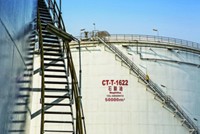Advertisement
Grab your lab coat. Let's get started
Welcome!
Welcome!
Create an account below to get 6 C&EN articles per month, receive newsletters and more - all free.
It seems this is your first time logging in online. Please enter the following information to continue.
As an ACS member you automatically get access to this site. All we need is few more details to create your reading experience.
Not you? Sign in with a different account.
Not you? Sign in with a different account.
ERROR 1
ERROR 1
ERROR 2
ERROR 2
ERROR 2
ERROR 2
ERROR 2
Password and Confirm password must match.
If you have an ACS member number, please enter it here so we can link this account to your membership. (optional)
ERROR 2
ACS values your privacy. By submitting your information, you are gaining access to C&EN and subscribing to our weekly newsletter. We use the information you provide to make your reading experience better, and we will never sell your data to third party members.
Business
New Chemical Partner For Planned Petrochemical Complex
Asia-Pacific: Evonik replaces BASF as Petronas’ partner in giant Malaysian complex
by Jean-François Tremblay
January 25, 2013
| A version of this story appeared in
Volume 91, Issue 4
BASF is out and Evonik Industries is in as a specialty chemical partner in a giant refinery and petrochemical complex being planned by the Malaysian oil company Petronas.
In 2010, BASF and Petronas proposed a $1.3 billion joint venture to make polyisobutylene, nonionic surfactants, methanesulfonic acid, and isononyl alcohol in Malaysia. But earlier this month the two firms announced that they were unable to come to a final agreement on the venture.
Just days after this revelation, BASF’s German compatriot Evonik said it would step in as a partner for Petronas and build plants for isononyl alcohol and various other chemicals. BASF, meanwhile, stated that it would move ahead with an isononyl alcohol plant in China with the Chinese oil major Sinopec. The companies had announced the project last July.
That Chinese plant is on track to start production in 2015, says Genevieve Hilton, a BASF spokeswoman in Hong Kong. Demand for isononyl alcohol, used to make nonphthalate plasticizers, is growing rapidly in China because of changing regulations intended to protect consumers, she adds.
Evonik’s Malaysian project includes a 250,000-metric-ton-per-year hydrogen peroxide plant, a 220,000-metric-ton isononyl alcohol facility, and a 110,000-metric-ton n-butene facility. The hydrogen peroxide will be used on-site to produce propylene oxide via a proprietary process.
The Malaysian complex is attractive for chemical producers because it will contain naphtha-fed ethylene crackers, says Samuel Liew, associate director for Asian olefins and elastomers at IHS Chemical, a market research firm. The petrochemical industry is now mostly building natural-gas-based crackers that yield few by-products. Naphtha crackers notably yield a generous stream of C4s, key raw materials for the chemicals that Evonik wants to produce.



Join the conversation
Contact the reporter
Submit a Letter to the Editor for publication
Engage with us on Twitter